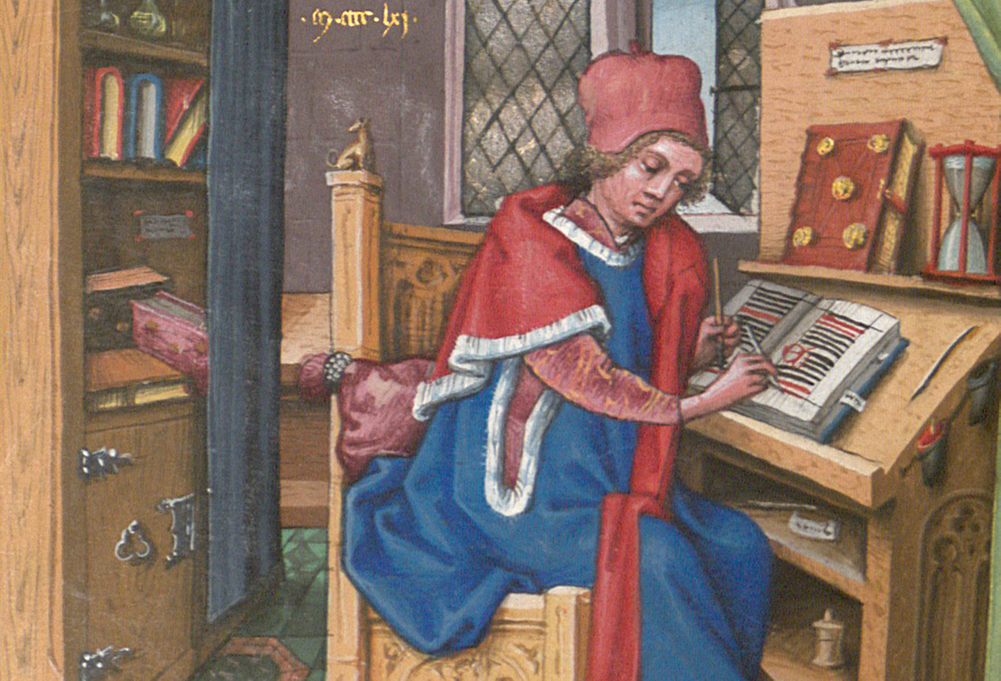
Source: Bayerische Staatsbibliothek, Cgm 48, fol. 1v (A006)
Note
The literature on Josquin Desprez is very extensive. However, a complete up-to-date bibliography does not currently exist. The most recent bibliography is by Sydney Robinson Charles and was published in his book Josquin des Prez: A Guide to Research (Garland Composer Resource Manuals, 1983).
A complete bibliography is not planned at this point. In the following, it will be a matter of pointing out a few important titles. However, the works mentioned in the section “Basics” contain extensive bibliographies which are a good starting point for the study of Josquin. Almost all modern literature on the subject can be found via the bibliographical (chargeable) database RILM (Répertoire International de Littérature Musicale).
Basically, the secondary literature on Josquin Desprez can be separated into the years before 1998 and after 1998: In 1998, Lora Matthews and Paul Merkley published their article “Iudochus de Picardie and Josquin Lebloitte dit Desprez: The Name of the Singer(s)”. Matthews/Merkley succeeded in identifying several persons with the name Josquin, all of whom were thought to be Josquin Desprez, thus shifting the assumed year of Josquin Desprez’s birth from around 1440 (consensus in research until 1998) by ten years to 1450.
Basics
The starting point for any study of Josquin Desprez is the excellent monograph Josquin by David Fallows (Brepols 2009, second edition 2020), one of the best experts on the 15th and 16th centuries. The monograph is not only exceedingly well-founded, but also entertaining – especially in the footnotes.
A very good overview of the different genres, a discussion of the current state of research, the challenges as well as an illumination of quite different aspects is offered by The Josquin Companion (Oxford 1998), edited by Richard Sherr in 1998. On almost 700 pages, leading Josquin scholars deal with his works and his biography. In addition, there are overviews of the works, important sources, an extensive annotated discography, a bibliography and a discussion of authenticity issues.
Good overviews of Josquin’s life, works and reception are provided by the two articles in the standard musical encyclopaedias Die Musik in Geschichte und Gegenwart (Josquin article by Ludwig Finscher) and The New Grove Dictionary of Music and Musicians (Josquin articles by Patrick Macey, Jeremy Noble, Jeffrey Dean and Gustave Reese ) as well as the introduction Josquin des Prez and His Musical Legacy: An Introductory Guide by Willem Elders (Leuven 2015). Short commentaries on the individual works can also be found here.
In many aspects outdated by today’s research results, but still well worth reading, is the anthology Josquin des Prez: Proceedings of the International Josquin Festival-Conference Held at the Juilliard School at Lincoln Center in New York City, 21-25 June 1971 (Oxford 1976), edited by Edward Lowinsky for the anniversary year 1971, and Helmuth Osthoff’s two-volume monograph Josquin Desprez (Tutzing 1962-65) – still a pioneering work of Josquin research.
Music history of the 15th and 16th centuries
In the German-speaking world, Ludwig Finscher’s Die Musik des 15. und 16. Jahrhunderts (The Music of the 15th and 16th Centuries) in the series Neues Handbuch der Musikwissenschaft (New Handbook of Musicology) is still the best introduction to the music of the late Middle Ages and the Renaissance (Laaber 1989/1990). The chapters on musical life (I), theory and practice (II), mass (III), motet (IV), on liturgical music in use (V) as well as on vernacular genres and instrumental music (VI) offer an excellent and very well-founded overview.
In England, the anthology Cambridge History of Fifteenth-Century Music, edited by Anna Maria Busse Berger and Jesse Rodin, has recently been published, which also illuminates Renaissance musical life in a variety of ways.
As an English-language introduction to Renaissance music, I can recommend Renaissance Polyphony by Fabrice Fitch (Cambridge 2020).
Articles
In addition to David Fallows, Joshua Rifkin, Jesse Rodin and Rob C. Wegman have provided important impulses for research in recent decades with provocative theses. A selection of influential articles reads:
- Wegman, Rob C.: “From Maker to Composer: Improvisation and Musical Authorship in the Low Countries, 1450-1500,” Journal of the American Musicological Society 49/3 (1996), 409-79
- Wegman, Rob C.: “And Josquin Laughed…”: Josquin and the Composer’s Anecdote in the Sixteenth Century,” Journal of Musicology 17/3 (1999), 319-57
- Wegman, Rob C.: “Who Was Josquin?”, in The Josquin Companion, ed. Richard Sherr (Oxford 2000), 21-50
- Wegman, Rob C.: “The Other Josquin,” Tijdschrift van de Koninklijke Vereniging voor Nederlandse Muziekgeschiedenis 58/1 (2008), 33-68.
- Rifkin, Joshua: “Munich, Milan, and a Marian Motet: Dating Josquin’s Ave Maria … virgo serena,” Journal of the American Musicological Society 56/2 (2003), 239-350
- Rifkin, Joshua: “A Black Hole? Problems in the Motet around 1500,” in The Motet around 1500: On the Relationship between Imitation and Text Treatment, ed. Thomas Schmidt-Beste (Brepols, 2012), 21-82
- Rifkin, Joshua: “Musste Josquin Josquin werden? Zum Problem des Frühwerks,” Archiv für Musikwissenschaft 74/3. (2017), 162-84
- Rifkin, Joshua: “Milan, Motet Cycles, Josquin: Further Thoughts on a Familiar Topic,” in Motet Cycles between Devotion and Liturgy, ed. Daniele V. Filippi and Agnese Pavanello (Schwabe, 2019), 221-338.
- Rodin, Jesse: “Josquin and Epistemology”, in Cambridge History of Fifteenth-Century Music, ed. Anna Maria Busse Berger and Jesse Rodin (Cambridge 2015), 119-36
The prize for the most original title of a technical article is definitely deserved by Herbert Kellman: Dad and Granddad Were Cops: Josquin’s Ancestry, published in Uno gentile et subtile ingenio: Studies in Renaissance Music in Honour of Bonnie J. Blackburn, edited by M. Jennifer Bloxam and Gioia Filocamo (Brepols, 2009), 183-200.